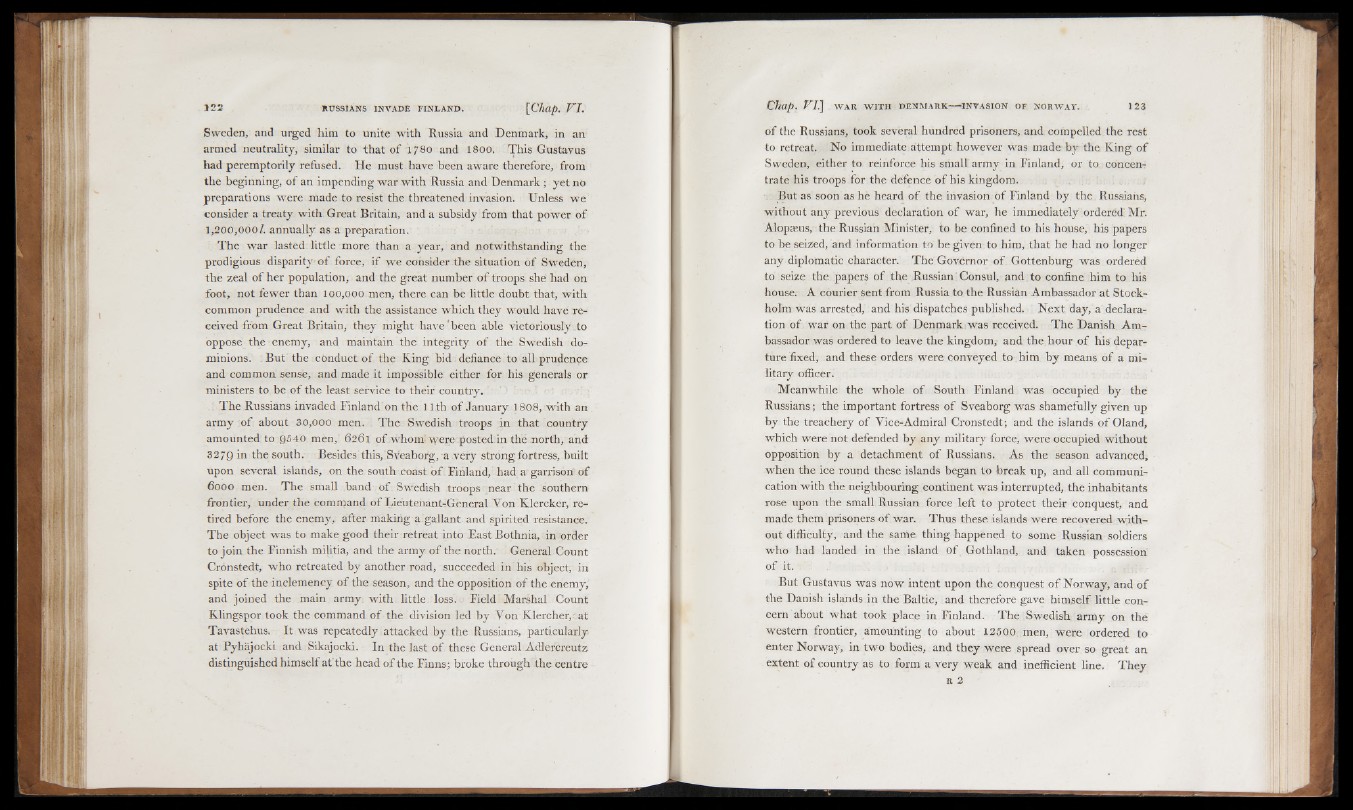
Sweden, and urged him to unite with Russia and Denmark, in an
armed neutrality, similar to that of 1780 and 1800. This Gustavus
had peremptorily refused. He must have been aware therefore, from
the beginning, o f an impending war with Russia and Denmark ; yet no
preparations were made to resist the threatened invasion. Unless we
consider a treaty with Great Britain, and a subsidy from that power of
1,200,000/. annually as a preparation.
The war lasted little more than a year, and notwithstanding the
prodigious disparity'of force, if we consider the situation of Sweden,
the zeal of her population, and the great number o f troops she had on
foot, not fewer than 100,000 men, there can be little doubt that, with
common prudence and with the assistance which they would have received
from Great Britain, they might have 'been able victoriously to
oppose the enemy, and maintain the integrity of the Swedish dominions.
But the conduct o f the King bid : defiance to all prudence
and common sense, and made it impossible either for his generals or
ministers to be of the least service to their country.
The Russians invaded Finland on the ] 1th o f January 1808, with an
army : o f about 30,000 men. The Swedish troops in that country
amounted to Q540 men,’ 6261 o f whom! were posted'in the north, and
3279 in the south. Besides this, Sveaborg, a very strong fortress, built
upon several islands, on the south coast of Finland, had a' garrison of
6000 men. The small band of Swedish troops near the southern
frontier, under the command of ’LieutenanGGeneral Von Klercker, retired
before the enemy, after making aigallant and spirited resistance.
The object was to make good their retreat into East Bothnia, in order
to join the Finnish militia, and the army of the north. General Count
Cronstedt, who retreated by another road, succeeded in’his object, in
spite o f the inclemency of the season, and the opposition o f the enemy,
and joined the main army, with little loss.. Field Marshal’ Count
Klingspor took the command o f the division led by Von Klercher,'at
Tavastehus. • It was repeatedly attacked by the Russians, particularly
at Pyhâjocki and Sikajocki. In the last o f these General AcUercreutz
distinguished himself at’the head of the Finns; broke through the centre
of the Russians, took several hundred prisoners, and compelled the rest
to retreat. No immediate attempt however was made by the. King o f
Sweden, either to reinforce his small army in Finland, or to concentrate
his troops for the defence o f his kingdom.
But as soon as he heard o f the invasion o f Finland by the Russians,
without any previous declaration of war, he immediately bordered Mr.
Alopteus, the Russian Minister, to be confined to his house, his papers
to be seized, and information to be given to him, that he had no longer
any diplomatic character. The Governor of Gottenburg was ordered
to seize the papers of the Russian Consul, and to confine him to his
house. A courier sent from Russia to the Russian Ambassador at Stockholm
was arrested, and his dispatches published. Next day, a declaration
of war on the part of Denmark, was received. The Danish Ambassador
was ordered to leave the kingdom, and the hour of his departure
fixed, and these orders were conveyed to him by means of a military
officer.
Meanwhile the whole of South Finland was occupied by the
Russians; the important fortress o f Sveaborg was shamefully given up
by the treachery of Vice-Admiral Cronstedt; and the islands of Oland,
which were not defended by any military force, were occupied without
opposition by a detachment o f Russians, As the season advanced,
when the ice round these islands began to break up, and all communication
with the neighbouring continent was interrupted, the inhabitants
rose upon the small Russian force left to protect their conquest, and
made them prisoners of war. Thus these islands were recovered without
difficulty, and the same thing happened to some Russian soldiers
who had landed in the island o f Gothland, and taken possession
of it. \
But Gustavus was now intent upon the conquest o f Norway, and of
the Danish islands in the Baltic, and therefore gave himself little concern
about what took place in Finland. T h e ’Swedish army on the
western frontier, amounting to about 12500; men, were ordered to
enter Norway, in two bodies, and they were spread over so great an
extent of country as to form a Very weak and inefficient line. They
r 2